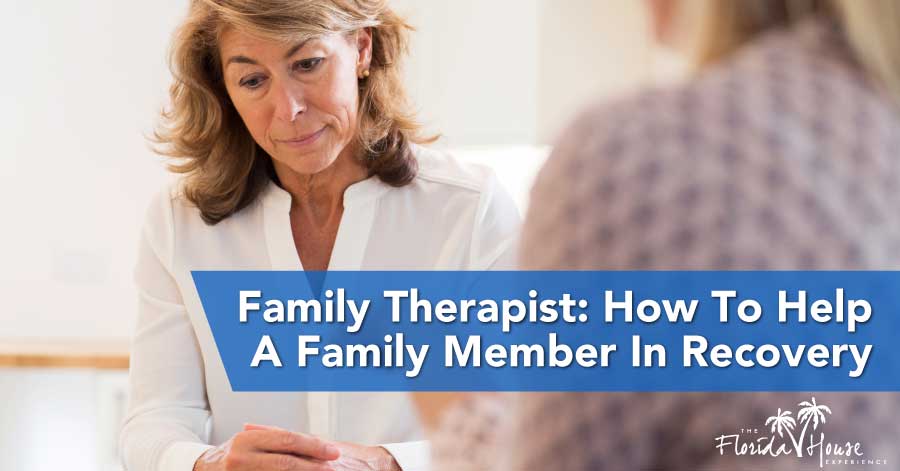
An interview with Family Program Director, Ivona Bhadha and Women’s Program Director, Mindy Appel
Maybe it was the night your husband didn’t come home, or the day that you realized your daughter had been stealing from you. At some point, most family members of people who are addicted realize that their loved ones illness has thrown their own life out of balance. Unfortunately, there’s little family members can do until your loved one is ready for help.

Now that your family member is in rehab, however, you have a chance to actively support your loved one’s recovery and help the whole family heal. The family’s role in addiction recovery is a critical one — you can help your loved one stay sober and break the cycle of addiction for the next generation.
Yet, learning how to support a family member in recovery can be difficult. At FHE Health, we guide families through the transition from active addiction to sobriety and emotional recovery. Through education and therapy, individuals and the entire family unit can heal together and move on from addiction.
Here, Mindy Appel, our women’s program director, and Ivona Bhadha, director of the family program, discuss why family is critical to the recovery process, and five steps that family members can take to support a loved one’s sobriety in the short- and long-term.
1. Help encourage change.
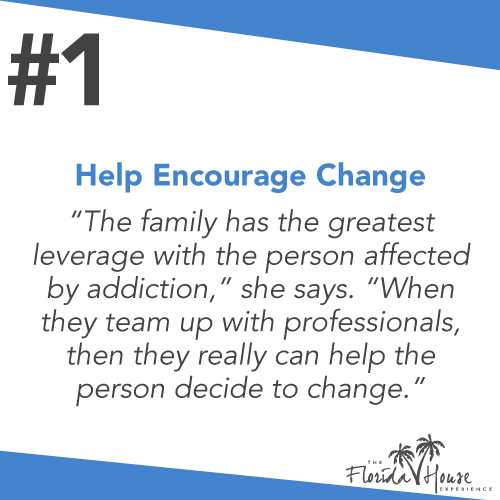 By the time a person gets to residential treatment, addiction has eaten away at the fabric of their lives, including their connection with loved ones. Addiction is a disease that thrives on lies and manipulation, which damages relationships. Resentment can run deep on both sides, as the addicted person and their family members exchange blame the disease and its consequences.
By the time a person gets to residential treatment, addiction has eaten away at the fabric of their lives, including their connection with loved ones. Addiction is a disease that thrives on lies and manipulation, which damages relationships. Resentment can run deep on both sides, as the addicted person and their family members exchange blame the disease and its consequences.
Despite this, family members still overwhelmingly have the ability to help motivate their loved ones to get better, Bhadha says.
“The family has the greatest leverage with the person affected by addiction,” she says. “When they team up with professionals, then they really can help the person decide to change.”
Through family therapy, the professionals at FHE Health help families rebuild connections that have been strained by addiction. The person seeking treatment can become motivated when they realize that despite their actions, their family still loves them and believes in their ability to live a sober life. Family members know what their loved one is like when they’re thriving, and can help the person in recovery connect with the best version of themselves.
2. Educate yourself.
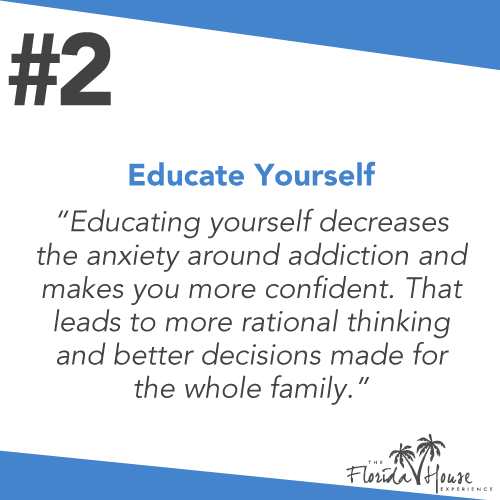 In order to overcome resentment about the damage that addiction has caused in your family, it’s important to learn about this disease. Educating yourself will help you separate the disease from the person you love. That makes it easier to forgive your loved one and move forward toward a healthier future where you’re not stressed or anxious about your loved one’s recovery.
In order to overcome resentment about the damage that addiction has caused in your family, it’s important to learn about this disease. Educating yourself will help you separate the disease from the person you love. That makes it easier to forgive your loved one and move forward toward a healthier future where you’re not stressed or anxious about your loved one’s recovery.
“There’s really a connection between being educated and decreasing internal anxiety,” Bhadha says. “Educating yourself decreases the anxiety around addiction and makes you more confident. That leads to more rational thinking and better decisions made for the whole family.”
After the chaos of living with active addiction, learning about the disease is empowering. That’s why FHE Health offers psychoeducation to help families learn about addiction, mental health, and recovery.
3. Understand your role.
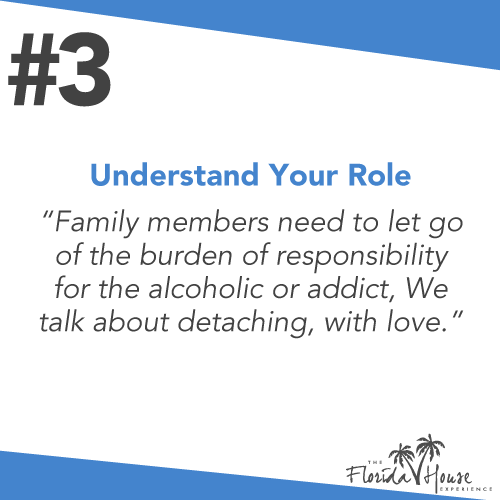 Addicts don’t live in a vacuum and their disease often ends up creating unhealthy behaviors in the people closest to them. It’s easy for family members who are trying to help a loved one to end up enabling them or becoming codependent. Because you are so emotionally attached to your family member, you feel their pain when they’re incarcerated or lose a job. This can leave you scrambling to try to stop the addict from experiencing the consequences of his or her actions. Ultimately, that’s unhealthy for everyone involved.
Addicts don’t live in a vacuum and their disease often ends up creating unhealthy behaviors in the people closest to them. It’s easy for family members who are trying to help a loved one to end up enabling them or becoming codependent. Because you are so emotionally attached to your family member, you feel their pain when they’re incarcerated or lose a job. This can leave you scrambling to try to stop the addict from experiencing the consequences of his or her actions. Ultimately, that’s unhealthy for everyone involved.
“Family members need to let go of the burden of responsibility for the alcoholic or addict,” Appel says. “We talk about detaching, with love.”
In family therapy, professionals like Appel and Bhadha help family members understand the role that they played in facilitating the addiction. Then, they assist with establishing healthy boundaries and understanding that family members must prioritize their own emotional recovery.
“It’s a process of shifting from that enabling, rescuing role to focusing more on the self rather than that other person,” Bhadha says.
This is important because if your loved one relapses, you will be able to maintain your own health rather than being sucked in to their relapse pattern. Ultimately, that will benefit them as well.
4. Speak your truth.
 Seeing your loved one making progress in treatment can be awe-inspiring. Yet, family members who have seen their loved ones struggling for years are often afraid to do or say anything that could disrupt the progress of treatment. However, addressing the wounds caused by addiction is essential for strengthening family ties and establishing healthy communication patterns.
Seeing your loved one making progress in treatment can be awe-inspiring. Yet, family members who have seen their loved ones struggling for years are often afraid to do or say anything that could disrupt the progress of treatment. However, addressing the wounds caused by addiction is essential for strengthening family ties and establishing healthy communication patterns.
“We emphasize truth over harmony,” Appel says. “We tell family members, ‘Say what you mean. You don’t have to say it brutally, but be honest and be truthful.’”
Although the truth might be painful for the person in recovery to hear, therapists like Appel and Bhadha guide families on how to share their truths without judgment, criticism or blame. Family members need to offer support without enabling and convey their feelings without judging. Talking about the harder parts of addiction without triggering defense mechanisms can help families move forward together.
5. Let the sober system work.
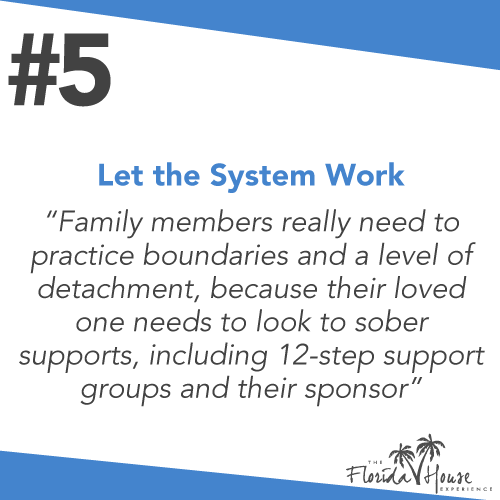 Once you’ve educated yourself about addiction and recovery and participated in family therapy, it’s tempting to think that you have the tools needed keep your loved one in recovery. However, it’s important to realize that this isn’t your role. As a family member, the best thing that you can do to support long-term recovery is to be a loving parent, spouse or sibling. Then, leave room for your family member to rely on their sober support system for maintaining their recovery.
Once you’ve educated yourself about addiction and recovery and participated in family therapy, it’s tempting to think that you have the tools needed keep your loved one in recovery. However, it’s important to realize that this isn’t your role. As a family member, the best thing that you can do to support long-term recovery is to be a loving parent, spouse or sibling. Then, leave room for your family member to rely on their sober support system for maintaining their recovery.
“If the family member is always ready to solve the problem, the person will not build a support system that includes other people in recovery,” Bhadha says.
This is another form of enabling, Appel explains.
“Family members really need to practice boundaries and a level of detachment, because their loved one needs to look to sober supports, including 12-step support groups and their sponsor,” she says.
You can be aware of what their sober system is, and be cognizant of when they are properly following it. This includes understanding the value of their medical monitoring and the importance of their follow-up with a psychiatrist. Remember though, these roles are best left to the psychiatrist, not you! Further family support can be found in fellowship groups such as Al-Anon, don’t underestimate the value of your own therapy.
Supporting a loved one in recovery is tough — especially when you realize that recovery isn’t just a stint in treatment, but an entire lifetime of work. However, the reward — a strong, healthy and united family — is well worth the effort. Learn more about our family program and our women’s program.






